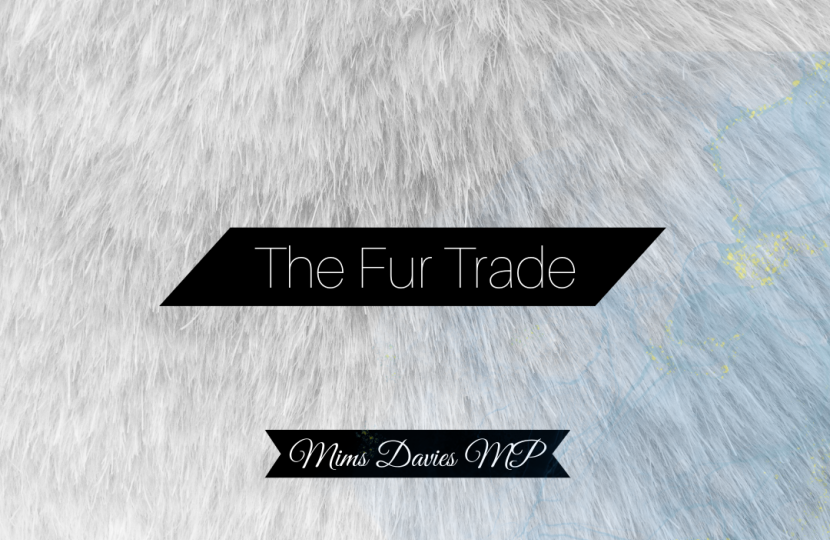
My colleagues and I are committed to upholding high standards in animal welfare. While in government, we rightly set out our vision and crucial actions to introduce a range of world-leading reforms to improve the welfare and conservation of animals at home and abroad. More details are here:
Action Plan for Animal Welfare - GOV.UK (www.gov.uk)
Regarding fur farming, it has rightly been banned in the UK for 20 years and our legislation prohibits the keeping and breeding of animals solely or primarily for slaughter for the value of their fur. There are also additional strict restrictions on some skin and fur products that may never be legally imported into the UK. Those include fur and fur products from cats and dogs, whose import, export and placing on the market is prohibited.
I do appreciate that there is considerable support for the complete banning of all imports of fur products - while fur cannot be farmed in the UK, it is still possible to import and sell other types of fur from abroad. However, I understand pleasingly the volume of fur that is imported and exported has fallen by 50% in the past five years.
In 2021, the Department for Environment, Food and Rural Affairs (Defra) published a call for evidence on the fur trade in Great Britain, which asked for views on animal welfare and on the social and economic impacts associated with the trade. Around 30,000 responses were received from businesses, representative bodies and individuals, demonstrating the strong public interest in this area.
I know that officials from Defra have been analysing the responses received and have also engaged directly with stakeholders. I hope that Defra continues to build a solid evidence base on the fur sector, which will then be used to inform any future action on the fur trade. The Private Members’ Bill being brought forward by Ruth Jones MP, Fur (Import and Sale) Bill is scheduled to have its Second Reading take place on Friday 13 June 2025 and I look forward to assessing the detail of the Bill as it is presented in due course.
I am also aware of the ongoing campaign to replace the real fur used in the bearskin King’s Guards' ceremonial caps with faux fur which I would like to address now.
Our Guardsmen report they do take great pride in wearing the bearskin cap, as an iconic image of Britain, and the MOD is very sparing in the acquisitions that it makes. That said, I can assure you that the MOD would like to find a suitable alternative material to bearskin should one prove acceptable. This is a commitment the MOD takes very seriously and under Government was focussed on progressing this.
Indeed, where sustainable, affordable and appropriate faux material exists, the MOD has moved forward and used it; the busby caps of the Royal Horse Artillery are a prime example. However, I believe those hats do not need to be worn with such regularity or all year round, indeed in reality they have to be worn all in the manner of very demanding conditions as the King’s Guards’ caps do.
Individual soldiers do not possess their own hats, rather they are cared for and shared within the Household Division and, despite their constant use, every effort is made to carefully prolong the longevity of each ceremonial cap I have been assured. On account of this, they usually last for more than a decade, with some having been in use for as long as 60 years.
I understand that several tests conducted on potential faux fur products have shown that, while water penetration was reduced, it still did not meet the necessary standard, and performed poorly in the remaining basic requirements areas. In addition, the most recent test results, provided by PETA from an accredited testing house, have been analysed by the MOD. The analysis concluded that the fabric only met one of the five basic requirements.
Consequently, the MOD have not, to date, seen evidence that a suitable faux fur product exists to be considered as an alternative. Until that material is sourced and proven, I can assure you that the UK goes to great lengths to ensure that the pelts that make the King's Guards' caps are procured in the most responsible way possible.
To be clear, I am reassured bears are never hunted to order for the MOD; the bear pelts used for the King’s Guards’ ceremonial caps are sourced exclusively from Canada and are a by-product of their programme to manage their wild bear population. Canada is a regulated market and a declared party to the convention on international trade in endangered species of wild fauna and flora.
A Ministry of Defence, answer to written questions on King’s Guards: Uniforms on 25th January 2024 stated under the Conservative Government at the time:
‘The MOD is open to considering the use of using human-made materials to replace natural fur items where they provide a suitable, affordable and sustainable alternative. As such we are prepared to assess accredited testing results of material to establish whether a synthetic alternative could meet the Department’s requirements for a replacement bearskin cap material.
However, to date, and to the Department’s knowledge, an alternative has yet to meet the standards required to provide an effective replacement for the bearskin ceremonial caps.’
Finally, I understand the Animal Welfare Committee has also been considering the issue of responsible sourcing in the fur industry, including the animal welfare standards and safeguards that apply to fur imported into this country.
I will continue to follow this issue closely, and remain assured I will keep the new Labour Government progress under review and will write to the Minister asking for clarification on actions they are now taking.




